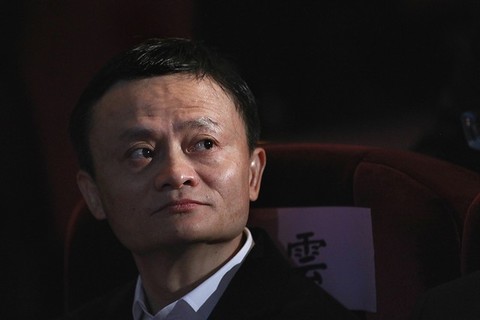Alibaba's Magic Touch | 11Main.com569
Pages:
1

|
LiquidLayer private msg quote post Address this user | |
Alibaba's Magic with 11Main Source Post on WWD Jack Ma knows how to make an entrance. The e-commerce mastermind — who founded Alibaba in 1999 and built the company into a sprawling digital empire in China — not only made his global move this year, but did it with a record-setting stock offering on Wall Street. Alibaba raised $25 billion in September in the biggest initial public offering ever as investors swarmed in to get a piece of its growth. (The firm’s sales shot up 52 percent last year to $8.44 billion, driving profits of $3.6 billion). The stock jumped 38 percent as soon as Average Joe investors were let into the game and has since risen another 16.3 percent, to $109.22, giving the company a market capitalization of $271.5 billion. (That’s just a stone’s throw from the market cap of Wal-Mart Stores Inc., which as the world’s largest retailer weighs in at $276.9 billion). Not bad for a company that was almost entirely off the Western World’s radar just a year ago. Although Alibaba now trades in New York, its center of gravity still is in its home country and with marketplace Taobao, online mall Tmall.com and mobile payments system Alipay. The firm also has sizable investments in Chinese microblogging platform Sina Weibo and other ventures, including the Guangzhou Evergrande Football Club. Alibaba controls 82 percent of the Chinese e-commerce market, serving 300 million users. It’s perhaps the only company in the world that can lay claim to its own holiday — Singles Day, an online shopping event targeting unattached youth. An unofficial holiday, for sure, but one that drove sales of $9 billion on Nov. 11. And Ma’s still just getting started. “I remember seven or eight years ago, maybe six years ago, I was drinking and chatting with a senior executive of Wal-Mart. I said that in 10 years, Alibaba’s sales revenues will surpass Wal-Mart’s,” Ma recalled earlier this year. “He said, ‘Young man, you have a vision, but take it slow. It will probably take at least 50 years.’ Today, we are getting closer and closer.” The total gross merchandise value of goods sold through Alibaba’s main marketplaces tallied $248 billion last year, versus Wal-Mart’s net revenues of $476 billion. Ma made the point that Alibaba’s middle-man business model, which frees it from the burden of inventory, allows it to scale quickly and easily. “In order to have 10,000 more customers, they need to buy a big piece of land and buy a lot of equipment and stuff,” said Ma, who spoke in Chinese. Alibaba is squaring off with Wal-Mart on its home turf with the June launch of 11 Main, a multicategory e-commerce destination. The site was inspired by the Main Street shopping experience, said Mike Effle, president and general manager of 11 Main, in an interview with WWD. Effle is, in essence, the tip of the spear when it comes to Alibaba’s move on the American market. Instead of focusing on luxury brands, 11 Main looks to provide an online channel for independent retailers who might not have had access to robust e-commerce capabilities. The site tracks the business model of Alibaba’s Tmall venture, with both providing platforms for merchants to operate storefronts. Neither own any of the inventory for sale. The biggest point of differentiation, though, is that Tmall works with brands like Burberry and Calvin Klein in an official capacity. 11 Main does not, and has no plans to in the foreseeable future. Upon its beta launch this summer, 11 Main — with a focus on small business owners — had about 50,000 items available for purchase from between 1,000 and 2,000 retailers. In October, 11main.com saw a soft opening, and last month, it released an app. “We made a pretty big bet at the beginning of the process to make sure that we were responsive in design so everything we did automatically translated to tablet, Web and mobile devices,” Effle said. “Mobile for us represents very much what mobile looks like for e-commerce in general. We had a lot of early adoption with our mobile app. We clearly made the right bet early.” Now, about 1.3 million products are live on the site from more than 2,000 merchants. Jewelry and watches are the largest category by assortment, with home making up the largest portion of sales. Effle said collectibles consistently is a strong vertical, with jewelry, watches and apparel steadily performing well, too. There are shops from 48 of the 50 states and approximately a 200-person staff headquartered in San Mateo, Calif., and Chico, Calif. While Effle declined to break out sales figures or make projections, it’s clear that being part of Alibaba has its perks for the U.S.-based venture. “We’re one of many entrepreneurial investments they’re making around the world,” he said. “It’s about thinking about the assets Alibaba has in other markets and leveraging them to make our merchants more effective. Alibaba has strength in markets outside the U.S., and we believe we can leverage this.” In addition to establishing a footprint in the U.S., Alibaba also made it possible for Chinese e-commerce consumers to shop from the e-commerce sites of their favorite Western brands. In October, payment arm Alipay (already used by hundreds of millions of Chinese consumers for e-commerce purchases) introduced ePass, a group of services that enabled Chinese consumers to buy directly from American sites. Jingming Li, Alipay U.S. president and chief architect, told WWD when the product launched that ePass offers secure, cross-border transactions through Alipay. It eradicates key obstacles like shipping, tax and customs processes, Li explained, adding that ePass has a marketing arm that helps American brands target desired Chinese consumers. Early partners include Uber, Gap, Gilt, Asos and Airbnb. In November, Alipay ePass partnered with Borderfree Inc. in a pilot program that will extend through the holiday season. Bloomingdale’s, Macy’s Inc., Ann Inc., Saks Fifth Avenue and Aéropostale Inc. all have access to ePass payments, logistics service and marketing in China through Borderfree’s global e-commerce platform. Analysts see Alibaba as powerful not just because of what it has — market share — but because of what it knows. “Alibaba is not only an e-commerce company, it has large amounts [of market and consumer] data, which gives it the advantage among all the Chinese Internet companies,” said Will Tao, analysis director at iResearch. “Another key sector is the financial business because Alipay, which is a very important part of the Alibaba group, has huge potential.” With the IPO, Alibaba has funds to at least make a good run at fulfilling its potential. “In the future [Jack Ma’s] ambition is to build a whole ecosystem, but right now, Alibaba’s purchases are fragmented and developing slowly,” said Ernan Cui, China consumer analyst at Gavekal Dragonomics. “The future is a model based on service consumption [rather than commodities consumption alone].” But for all its strengths, Alibaba’s middle-man approach also can be seen as a weakness, and something that Wal-Mart and others are lining up to try to exploit. “Alibaba is an Internet firm.…It doesn’t have any hardware services like Google or Apple or Microsoft, which people rely on, leaving them open to competitors,” Cui said. “The major weakness is they lack their own supply chain. Retail revenues are highly dependent on the growth of the retailer in their own ecosystem.” Alibaba’s sure on the radar now. Alibaba's Magic with 11Main Source Post on WWD 11Main.com See our shop on 11Main.com here |
||
| Post 1 • IP flag post | ||

|
LiquidLayer private msg quote post Address this user | |
| Radur October 6, 2014 5:5PM What a breath of fresh air. Dang Lara you and chairman Jack Ma have given me hope for future entrepreneurs. The business plan to put customers first, employees second and shareholders third reminded me, of the old days, it worked back then why not now? This idea of paying employees minimum wage, part time to avoid benefits, only to make shareholders rich. Is not sustainable. Employees, can't even afford the products they sell. I might mention EBay gave my sister some money, no strings attached, after Katrina hit. My hat goes off to them as well. |
||
| Post 2 • IP flag post | ||

|
LiquidLayer private msg quote post Address this user | |
| Jack Ma brings Alibaba to the U.S. http://www.cbsnews.com/news/alibaba-chairman-jack-ma-brings-company-to-america/ The following is a script of "Chairman Ma" which aired on Sept. 28, 2014. Lara Logan is the correspondent. Howard Rosenberg, producer. By now you've probably heard of Alibaba, the Chinese Internet giant that's able to reach millions upon millions of previously unreachable Chinese consumers. The company went public this month on the New York Stock Exchange and became one of the most valuable in the world and Alibaba is just getting started. Everything about the Alibaba story is unconventional. Beginning with its founder, Jack Ma, who gained global celebrity status these past 10 days, as his image became ubiquitous on business news channels and media outlets across America. We got to know Jack Ma before the onslaught, beginning over a year ago in China, where he talked with us about his relationship with the Chinese government, and his unorthodox business philosophy, which surprisingly, gives shareholders almost no say over how he runs the company. Jack Ma: If you want to invest in us, we believe customer number one, employee number two, shareholder number three. If they don't want to buy that, that's fine. If they regret, they can sell us. Lara Logan: In the U.S., the shareholder is usually first. Jack Ma: Yeah. And I think they were wrong. The shareholder, good. I respect them. But they're the third. Because you've take care of the customer, take care of the employees, shareholder will be taken care of. Ma's unconventional view didn't stop Wall Street from pouring $25 billion into his company, now listed on the New York Stock Exchange as "BABA." It's an Internet shopping behemoth, a collection of online marketplaces where buyers and sellers connect to do business. Most of the company's money comes from advertising and small transaction fees. On its most popular website, Taobao, users talk to each other, barter and engage in a way that doesn't happen on American e-commerce websites and Alibaba says there are close to a billion products for sale. Lara Logan speaks with the founder who took $50,000 in seed money and created a company valued at $231 billion Read the transcript here |
||
| Post 3 • IP flag post | ||
Pages:
1
